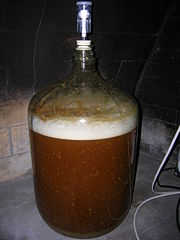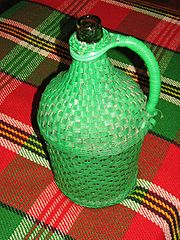- Carboy
-
"Demijohn" redirects here. For other uses, see Demijohn (disambiguation).
 A 6.5-gallon (24.7 l) glass carboy acting as a fermentation vessel for beer. It is fitted with a fermentation lock.
A 6.5-gallon (24.7 l) glass carboy acting as a fermentation vessel for beer. It is fitted with a fermentation lock.
 A Bulgarian demijohn (damadzhana)
A Bulgarian demijohn (damadzhana)
A carboy is a rigid container with a typical capacity of 5 to 15 gallons (20 to 60 L).[1] Carboys are primarily used for transporting fluids, often water or chemicals.[2]
They are also used for in-home fermentation of beverages, often wine.
Contents
Brewing
In brewing, a carboy is also known as a demijohn. It is a glass or plastic vessel used in fermenting beverages such as wine, mead, and beer. Usually it is fitted with a rubber stopper and a fermentation lock to prevent bacteria and oxygen from entering during the fermentation process.
During the homebrewing process, a primary carboy is used for fermentation. Once primary fermentation is complete, the beer is either transferred to a secondary carboy for conditioning or it can be transferred directly to bottles for conditioning. (This process of transferring is usually called racking.)
Polypropylene carboys are also commonly used in laboratories to transfer purified water. They are typically filled at the top and have a spigot at the bottom for dispensing.
The word carboy is from the Persian qarabah (قرابه), from Arabic qarraba, "big jug".[3]
Carboys come in various volumes ranging from 1 to 6.5 gallons (3.8 to 24.7 L). The term carboy itself usually refers to a 5 gallon (19 L) carboy, unless otherwise noted. A 1.25 gallon (4.5 L) carboy is usually called a jug. A 15 gallon (57 L) carboy is usually called a demijohn (in the Philippines, "dama juana".[4])
"Demijohn" is an old word that formerly referred to any glass vessel with a large body and small neck, enclosed in wickerwork. The word may derive from the name of a Persian town, Damghan, but this is not supported by any historical evidence. According to The Oxford English Dictionary the word comes from the French dame-jeanne, literally "Lady Jane", as a popular appellation. This is in accordance with the historical evidence at present known, since the word occurred initially in France in the 17th century, and no earlier trace of it has been found elsewhere.
In Britain, demijohn refers to a 4.5 litre glass brewing vessel.
Laboratory
In modern laboratories, carboys are usually made of plastic, though traditionally were (and still are in many university settings) made of ferric glass or other shatter-resistant glasses immune to acid corrosion or halide staining common in older plastic formulations. They are used to store large quantities of liquids, such as solvents or deionised water. In these applications, a tap may be included for dispensing. Carboys are also used to collect and store waste solvents. Collecting waste solvents in plastic carboys is preferable to reusing glass Winchesters due to the lesser chance of breakage if a solution is placed in an incorrectly labeled carboy.
See also
- Fermentation (food)
- Jerrycan - another large sized fluid container
References
- ^ ASTM D996, Packaging Terminology
- ^ Soroka, W (2008). Glossary of Packaging Terminology. IoPP. pp. 33. ISBN 1-930268-27-0.
- ^ Hull Museums Collection hullcc.gov.uk
- ^ Ocampo, Ambeth R. (August 9, 2006) Philippine Daily Inquirer Tanduay. Page 13.
External links
Categories:- Homebrewing
- Containers
- Wine packaging and storage
- Laboratory glassware
Wikimedia Foundation. 2010.
